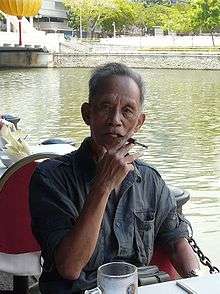Đặng Phong
Đặng Phong (1937–2010), born in Hà Tây Province, Vietnam, was a historian specialized in Vietnam's economic history of the 19th and 20th centuries.
He graduated from Hanoi University, Faculty of History, in 1960, National Economics University, Planning Faculty, in 1964 and the Mediterranean Agronomic Institute of Montpellier (Institut Agronomique Méditerranéen de Montpellier) in 1991. He wrote many articles and books about Vietnam's economic history during the French colonization period, South Vietnam, the centrally planned economy period, and more recently on the "Doi Moi" (reform) in Vietnam.

Đặng Phong worked as researcher at the Institute of Economics, Vietnam Academy of Social Sciences, from 1961 to 2000. He also taught at the Hanoi University of Business and Technology from 1996 to 2009. For his vast knowledge, he has also been visiting scholar to various universities around the world. He is internationally recognized as the leading scholar of twentieth-century Vietnamese history among his generation in Vietnam. He was also the author of various articles in the media, including the BBC in Vietnamese.
Đặng Phong died of cancer on 20 August 2010.
Early life
Đặng Phong was the second of the two sons of a colonial official and a teacher. His youth was marked by the following historical events, of which he was a witness:
- US bombs against Japanese interests in Hanoi and the Tonkin famine (1944)
- the August revolution and Declaration of Independence in Hanoi (1945)
- evacuation from Hanoi on the outbreak of the Indochina War (1946)
- events of war in the countryside (1947-1954)
- Việt Minh reoccupation of Hanoi (1954)
His father's decision to join the Việt Minh in 1944 influenced his education, which he received by night in the 'liberated zone' from 1947-1954. After independence, he studied at Hanoi University and took a BA in history in 1960. Aged twenty-three he was employed by the Institute of Economics. His interest in economic history dated from this time.
Public service and career
In 1965, American bombings started and he was evacuated to a village in Bắc Giang province. In 1967, he was sent as soldier and war correspondent on the southern front (Khe Sanh, Quảng Trị province). Wounded, he returned to Hanoi in 1968. Upon Vietnam's reunification, he conducted research in Saigon (May–September 1975), and presented a report to the Institute of Economics on US aid to South Vietnam.
In 1983, he was appointed to the State Committee for Markets and Prices, an economic analysis agency above ministerial rank, where he established the journal Markets and Prices Review. In 1988, this agency assigned him to compete for a scholarship to France, which he won, and spent a year at the Institut Agricole Méditerranéen in Montpellier.
In 1995, he returned to the Institute of Economics, and signed a contract with the same institute after his formal retirement in 2003. He signed a similar contract with his second employer, the Hanoi University of Business and Technology. He co-authored books with Professor Đỗ Hoài Nam (President of the Vietnamese Academy of Social Sciences) and served as personal assistant to Mr Võ Văn Kiệt (Prime Minister of Vietnam, 1991-1996).
His major works include:
- The Primitive Economy in Vietnam, Social Science Publishing House (NXB Khoa học Xã hội),[1] Hanoi, 1970;
- The Communal Land System in Vietnam and the Asian Mode of Production, Social Science Publishing House (NXB Khoa học Xã hội), Hanoi, 102p., 1976;
- Twenty-One Years of American Aid in (South) Vietnam, Information Publishing House (NXB Thông Tin), 1991;
- "The Private Sector in Vietnamese Industries from 1945 to the Present", in Private Sector Discussions, Mekong Project Development Facility, International Finance Corporation,[2] World Bank Group, Hanoi, 1999, pp. 73–90.
- Part II: The Development of unofficial Trade and Aid, 1976–1996", in Ðặng Phong and Melanie Beresford , Economic Transition in Vietnam: Aid and Trade in the Demise of a Centrally Planned Economy, Edward Elgar, Cheltenham, UK and Northampton MA, USA, pp. 69–161, 2000;
- Comparison of Economic Reform Between China and Vietnam (co-authored);
- Authority relations and economic decision-making in Vietnam : a historical perspective (co-authored with Melanie Beresford), Nordic Institute of Asian Studies (NIAS) 1998, NIAS series no. 38 [3]
- Long An, a Break-Through into Market Economy (co-authored with Ngoc Thanh);
- Break-Through Steps of An Giang on the Way to Reform;
- History of the State Bank of Vietnam, 1945–2005, The National Political Publishing House (NXB Chính trị Quốc gia),[4] Hanoi, 2007;
- Vietnam's Economic History,1945–2005, Vol. 1: 1945-1954], preface by Do Hoai Nam, Social Science Publishing House (NXB Khoa học Xã hội), 662p., Hanoi, 2002;
- Vietnam's Economic History, the Economy of the South, 1954–1975, Social Science Publishing House (NXB Khoa học Xã hội), Hanoi, 2004;
- Vietnam's Economic History, 1945–2000, Vol. 2.: 1955-1975: Vietnam Academy of Social Science , Social Science Publishing House (NXB Khoa học Xã hội), 2005;
- Monograph of Thai Nguyen Province, The National Political Publishing House (NXB Chính trị Quốc gia), Hanoi 2005;
- Fifty-Year History of the Vietnam Investment and Development Bank, 1957–2007, The National Political Publishing House (NXB Chính trị Quốc gia), Hanoi 2007;
- Two-Century History of Markets and Prices in Vietnam (early nineteenth to early twenty-first centuries), The National Political Publishing House (NXB Chính trị Quốc gia), Hanoi 2007;
- Vietnam's Economic Mindset: A Daunting and Spectacular Road, 1975–1989[5]
- The Five Ho Chi Minh Trails,[6]
- Stories of Thang Long - Ha Noi Through One Street, Intellect Publishing House (Nhà Xuất Bản Trí Thức), Ha Noi, 2010 [7]
References
- http://www.vass.gov.vn/home/nhaxuatban_khxh/sitemap
- http://www.ifc.org/mpdf
- https://ext.kb.dk/F/97BXNTBDIF3A3J6YXT8RA6E2SDKYT9CH4442GJ1RE8XUSV7CQG-21259?func=full-set-set&set_number=005113&set_entry=000002&format=999
- http://www.nxbctqg.org.vn/
- Southern Intellect Publishing House, August 2008
- Southern Intellect Publishing House, August 2008
- The book was launched on the 100th day after Đặng Phong's death. The French School of the Far East, the Vietnam Academy of Social Sciences, and the Intellect Publishing House co-organized the launch. https://docs.google.com/leaf?id=0B02ObkOtqQQPN2I4N2IwMjItZjhmMS00N2NhLWEwYzQtYmQzNGE2NmZkOGNm&hl=en